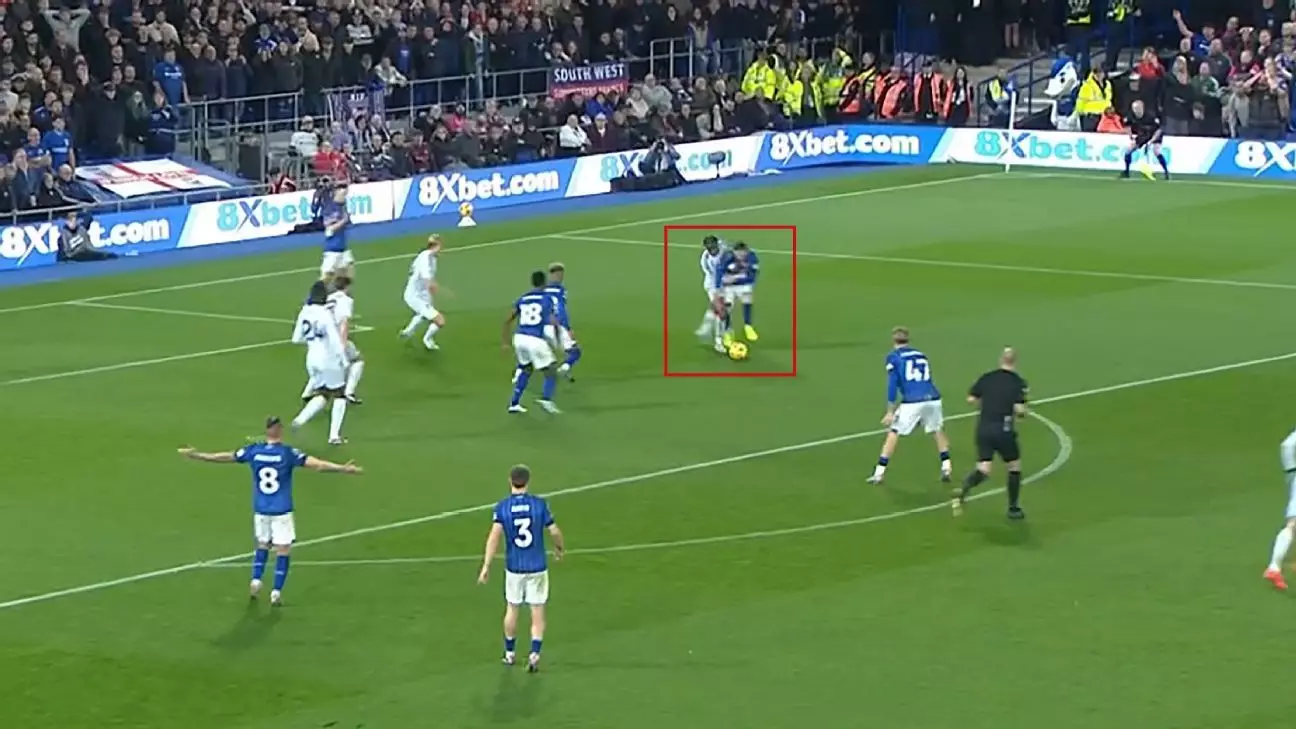In recent times, the implementation of Video Assistant Referee (VAR) in football has become a lightning rod for controversy among players, coaches, and fans alike. In the spotlight is Ipswich Town’s chairman Mark Ashton, who has publicly voiced his discontent following a frustrating incident during their recent match against Leicester City. Ashton believes that the failure to award a penalty to Ipswich represents a blatant “injustice” that should not be brushed aside. His vehement criticism highlights broader concerns regarding the effectiveness and reliability of VAR as it relates to the integrity of the game.
Ipswich found themselves in a precarious position during the match, leading 1-0 until a pivotal moment in the 77th minute. A foul by Leicester’s Fatawu Issahaku on Ipswich’s Conor Chaplin went unpunished when referee Tim Robinson allowed the match to continue. The subsequent actions led to a chaotic sequence, ultimately resulting in Kalvin Phillips receiving a second yellow card for a foul on Ricardo Pereira. Surprisingly, VAR did not intervene to rectify what many would deem an obvious penalty decision. This incident is not an isolated case; it underscores a growing sentiment of frustration among clubs, particularly those outside the traditional powerhouses of English football.
Ashton’s remarks paint a picture of a chairman grappling with an existential crisis regarding the fate of his club in the Premier League’s new landscape dominated by technology. In the lead-up to the match, he had even telegraphed his concerns directly to Howard Webb, the chief refereeing officer of the Professional Game Match Officials Limited (PGMOL). The situation he described, wherein he felt compelled to reach out based on an instinctual premonition of unfairness, reflects both his passion for Ipswich Town and the prevailing discontent over omitted crucial calls in matches.
While expressing his fervent dedication to fighting for the club, Ashton acknowledged the precarious line he walks in terms of criticism. The inability to voice grievances without risking repercussions from governing bodies reveals a troubling aspect of football governance. His commitment to his team and fanbase remains steadfast, but the question arises: how much longer can clubs persist in a system they perceive as fundamentally flawed?
Drawing upon his extensive experience in football, Ashton elucidates a critical examination of the structural inconsistencies surrounding VAR. From his vantage point, the argument hinges not solely on a single decision but a pattern of inconsistencies that could fundamentally impact the outcome of matches. He alluded to three distinct decisions that went against Ipswich thus far this season—decisions that frustrated players, coaching staff, and fans alike. Questions about the lack of uniformity in refereeing standards raise serious doubts about the fairness of the game.
More deeply, Ashton raises an important query regarding whether the current application of VAR has truly improved the quality of match officiating or merely complicated it further. With his staunch belief that the entertainment aspect of football diminishes under the rigid checks of VAR, the question remains: Is the pursuit of absolute accuracy in officiating worth the trade-off in viewer enjoyment and the spirit of the game? His expressed belief that he could no longer support VAR if given the opportunity to vote again speaks volumes about the potential backlash from other clubs and officials if these frustrations persist.
As Ipswich Town navigates a turbulent season, the implications of VAR’s shortcomings resonate beyond just the club. A broader dialogue is urgently needed regarding the accountability of referees and the institutions that govern officiating in football. Ashton’s insistence on needing answers from the PGMOL encapsulates a sentiment that permeates through the footballing community. If officials and governing bodies are unwilling to adapt and improve the system, the integrity of the game may be called into question.
Despite refraining from making outright accusations of bias against larger clubs, Ashton’s observations raise significant concerns about perceived favoritism and the statistical imbalances that may arise in officiating. The need for empirical data to assess the relative merits—or lack thereof—of VAR usage is paramount. If proper measures are not taken to ensure fairness and consistency, it risks undermining the very foundation of competitive football.
Ashton’s critique of VAR highlights a pivotal moment not just for Ipswich Town but for football as a whole. The issues surrounding consistency, transparency, and fairness demand an urgent response from those in positions of authority. As fans, clubs, and stakeholders rally for clarity, the future of VAR will inevitably hinge upon its capacity to restore faith in the officiating process and enhance, rather than detract from, the beautiful game. Without proactive steps towards reform, football risks losing the passion and excitement that ignites its loyal fanbase. The coming weeks will be critical, and the footballing community awaits meaningful answers and actions to address these pressing concerns.

